Telnyx
Best voice APIs for text-to-speech
In today's digital landscape, text-to-speech (TTS) technology has become essential for creating engaging customer experiences, improving accessibility, and scaling communication efforts.

Best voice APIs for text-to-speech
In today's digital landscape, text-to-speech (TTS) technology has become essential for creating engaging customer experiences, improving accessibility, and scaling communication efforts. Whether you're building voice assistants, automating call centers, or enhancing digital products with voice capabilities, choosing the right TTS API can make or break your application.
With customer expectations at an all-time high and automation becoming critical across regulated industries, businesses need robust, compliant, and scalable TTS solutions more than ever. This comprehensive guide examines the top voice APIs for text-to-speech, evaluating each on quality, control, features, and cost-effectiveness.
What makes a great text-to-speech API?
Before diving into our rankings, it's important to understand what separates exceptional TTS APIs from the rest. According to industry experts, the key factors include voice quality and naturalness, language and accent support, customization capabilities, latency and performance, pricing transparency, and compliance with industry regulations.
The top voice APIs for text-to-speech in 2025
1. Telnyx Voice AI
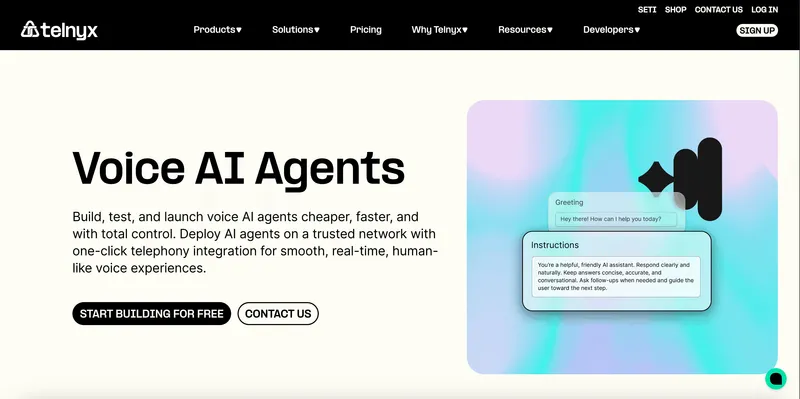
Telnyx stands apart from every other provider on this list for one fundamental reason, they own the entire communications stack and their TTS API is specifically designed for real-time calls. While providers like Google, Amazon, and ElevenLabs excel at podcasts, videos, and creative work that doesn't require telephony, Telnyx is custom-built for live voice interactions. What's more, Telnyx offers unmatched flexibility, you can use their proprietary voices or choose from Google Cloud, Amazon Polly, ElevenLabs, and Microsoft voices through their unified TTS API, all while leveraging Telnyx's secure and reliable telephony network. This means you get the best of both worlds, access to multiple voice providers plus the rock-solid infrastructure only a full-stack owner can provide.
Telnyx’s in-house TTS engine is specifically built for real-time voice applications. It generates expressive, human-like speech with subtle conversational cues like filler words and soft laughter. As it runs directly on Telnyx’s private, GPU-backed infrastructure, it is a flexible, cost-effective option, perfect for teams seeking low-latency, scalable solutions with full deployment control.
Key Advantages:
| Full-Stack Ownership | Direct control over infrastructure means lower latency, higher reliability, and no hidden third-party markups |
|---|---|
| Voice AI Agents | Purpose-built for fast, secure, and cost-effective TTS-powered voice experiences |
| Real-Time Control | Application-layer control for dynamic voice adjustments during calls |
| Seamless Migration | Easy transition from other platforms with comprehensive support |
| Enterprise Compliance | Built-in security and compliance features for regulated industries |
| Transparent Pricing | No surprise fees or complex pricing tiers |
Telnyx Voice AI Agents enable businesses to deploy sophisticated real-time voice applications quickly, with the unique flexibility to choose between Telnyx's optimized TTS engine or integrate voices from Google, Amazon, Microsoft, or ElevenLabs, all within the same call flow. For organizations building voice-enabled customer experiences, Telnyx is the only provider that combines purpose-built telephony infrastructure with multi-provider TTS flexibility.
2. Google Cloud
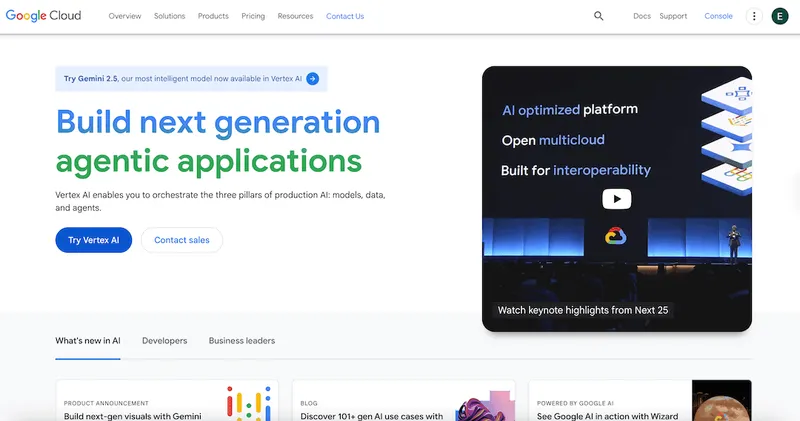
Google's TTS API leverages WaveNet technology to produce natural-sounding speech. As noted in multiple industry reviews, Google offers extensive language support and neural voice options.
Strengths:
- Advanced neural network models
- Wide language and accent coverage
- Integration with Google Cloud ecosystem
- Custom voice creation capabilities
Limitations:
- Can become expensive at scale
- Complexity in setup and configuration
- Dependency on Google Cloud infrastructure
3. Amazon Polly
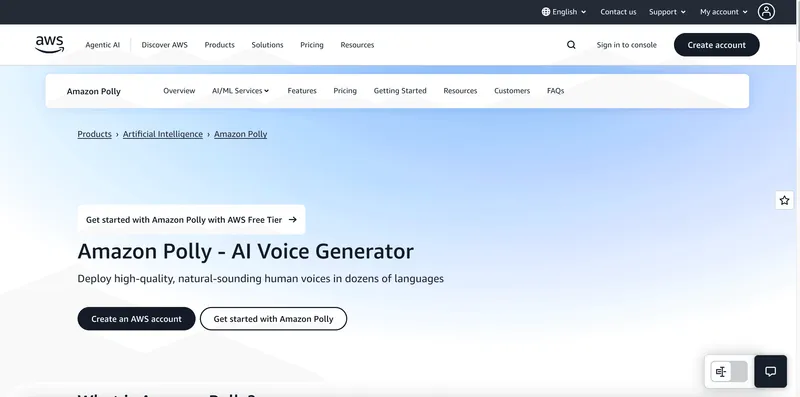
Amazon's TTS service integrates well within the AWS ecosystem, making it a good choice for businesses already using Amazon services. Recent comparisons highlight its SSML support and lexicon features.
Strengths:
- Deep AWS integration
- Neural and standard voice options
- Real-time streaming capabilities
- Custom pronunciation lexicons
Limitations:
- Tied to AWS ecosystem
- Limited voice customization compared to specialized providers
- Pricing complexity with multiple charge components
4. Microsoft Azure Cognitive Services Speech
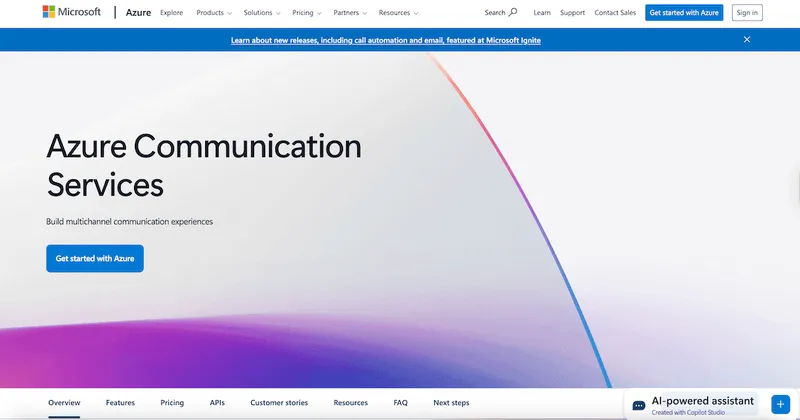
Microsoft's offering provides solid enterprise features with strong multilingual support. According to reviews, Azure excels in business integration scenarios.
Strengths:
- Enterprise-grade security and compliance
- Custom neural voice creation
- Real-time synthesis
- Strong language support
Limitations:
- Azure dependency
- Higher learning curve
- Cost can escalate quickly with custom voices
5. ElevenLabs
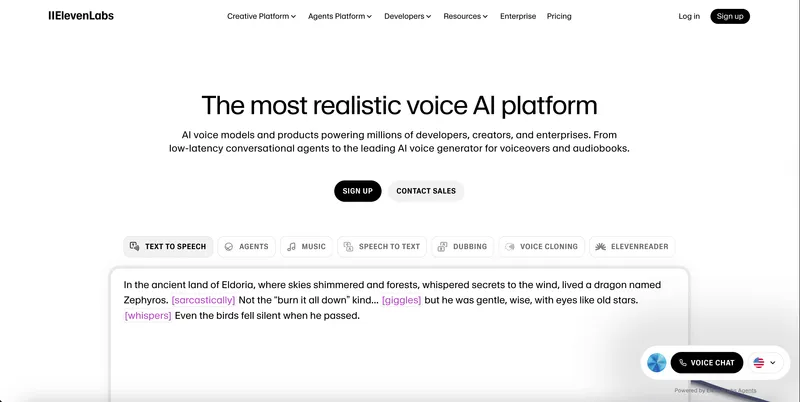
A newer entrant focused on ultra-realistic voice synthesis, ElevenLabs has gained attention for its voice cloning capabilities. Industry analysis highlights its creative applications. For businesses evaluating alternatives, Telnyx offers a compelling ElevenLabs alternative with enterprise-grade reliability and full-stack advantages.
Strengths:
- Extremely realistic voice quality
- Voice cloning from samples
- Emotional control parameters
- Growing voice library
Limitations:
- Limited language support
- Higher pricing for commercial use
- API stability concerns for mission-critical applications
6. Play.ht
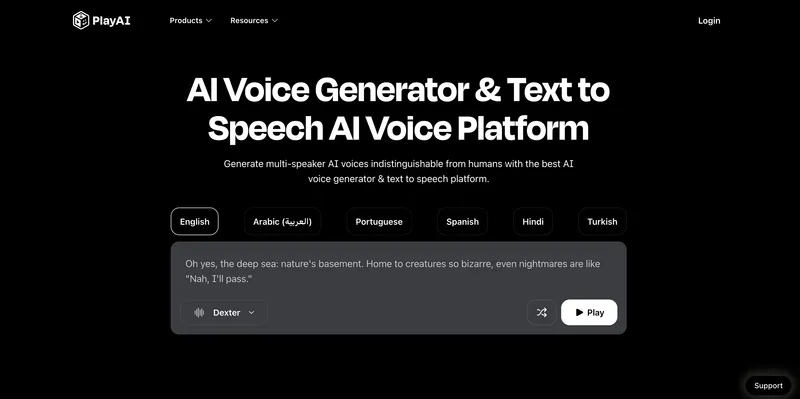
Specializing in content creation and publishing, Play.ht offers a user-friendly approach to TTS. As noted by reviewers, it's particularly strong for podcasting and audio content.
Strengths:
- Easy-to-use interface
- Good selection of natural voices
- Audio editing features
- WordPress integration
Limitations:
- Limited enterprise features
- Not ideal for real-time applications
- Restricted API capabilities
7. Murf.ai
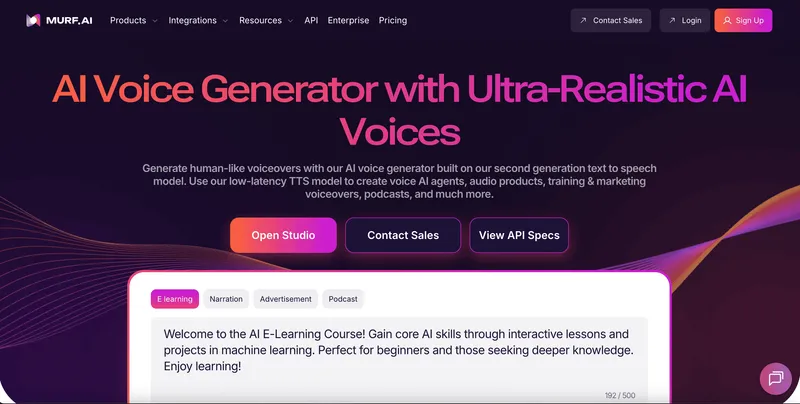
Murf focuses on professional voiceover creation with studio-quality output. Recent evaluations praise its voice customization options.
Strengths:
- Professional voice quality
- Pitch and speed controls
- Collaboration features
- Media synchronization tools
Limitations:
- Primarily designed for content creation, not real-time
- Limited API functionality
- Higher cost for API access
8. WellSaid Labs
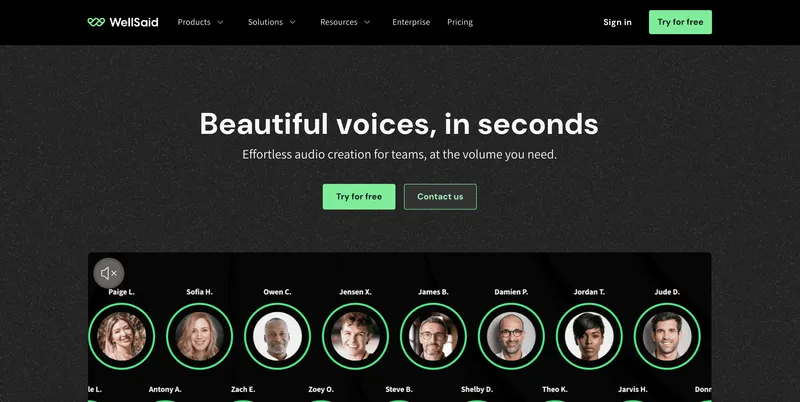
Targeting enterprise and creative professionals, WellSaid offers high-quality synthetic voices. Industry comparisons show strong performance in corporate training and e-learning.
Strengths:
- Professional voice avatars
- Consistent voice quality
- Team collaboration tools
- Custom voice creation
Limitations:
- Limited language options
- Premium pricing
- Smaller voice library
Key considerations when choosing a TTS API
If you're planning to use TTS for voice applications, whether it's customer service automation, voice assistants, or interactive voice response systems, you need a provider that's purpose-built for real-time communications. Not all TTS APIs are created equal, many are optimized for content creation or batch processing rather than the demanding requirements of live voice interactions. Here's what to evaluate:
Performance and latency

For real-time applications like voice assistants or call centers, latency is critical. Telnyx's owned infrastructure provides the lowest latency, while cloud providers may introduce variable delays depending on region and load.
Voice quality and naturalness
Modern neural TTS has dramatically improved voice quality, but differences remain. Expert evaluations consistently show that the latest neural models produce the most natural results.
Compliance and security
Regulated industries require robust security and compliance features. Enterprise providers like Telnyx, Microsoft, and Amazon offer comprehensive compliance certifications, while smaller providers may lack necessary certifications.
Total cost of ownership
Beyond per-character pricing, consider infrastructure costs, integration complexity, and hidden fees. Cost analyses show that providers with transparent pricing and no third-party markups offer better long-term value.
Scalability
Your chosen API must handle growth without degradation. Full-stack providers like Telnyx scale seamlessly, while others may require architectural changes as volume increases.
Voice Quality and Naturalness
Modern neural TTS has dramatically improved voice quality, but differences remain. Expert evaluations consistently show that the latest neural models produce the most natural results.
Migration and Integration
Switching TTS providers doesn't have to be painful. Leading providers offer migration support and compatibility layers. Telnyx, for example, provides comprehensive migration assistance to ensure smooth transitions from other platforms.
Industry-specific applications
Contact centers
Voice quality, low latency, and reliability are paramount. Telnyx's Voice AI Agents excel here with real-time control and enterprise features.
E-learning and training
Consistency and clarity matter most. Providers like WellSaid and Murf offer strong solutions for educational content.
Content creation
For podcasts and media production, Play.ht and ElevenLabs provide creative flexibility and high-quality output.
Healthcare and finance
Compliance and security are non-negotiable. Enterprise providers with proven compliance records are essential.
The future of text-to-speech APIs
The TTS landscape continues to evolve rapidly with advances in neural networks, emotional intelligence, and real-time processing. As part of the broader ecosystem of AI tools revolutionizing business communications, TTS APIs are becoming increasingly sophisticated. Providers investing in infrastructure and innovation will lead the next generation of voice experiences.
Final thoughts
The text-to-speech API landscape offers diverse options for every use case and budget. However, for businesses seeking the optimal combination of quality, control, reliability, and value, Telnyx stands alone as the only provider owning the entire communications stack from network to application.
By owning the entire communications stack and offering both proprietary and third-party voice options, Telnyx delivers unmatched performance and flexibility for real-time voice applications. Their Voice AI Agents represent the next evolution in call-based TTS technology, providing the tools needed to build sophisticated voice experiences that scale with your business.
Whether you're modernizing customer service, building voice-enabled products, or automating communications, choosing the right TTS API is crucial for success. Consider your priorities carefully, evaluate total cost of ownership, and select a provider that aligns with your long-term goals.
Ready to experience the difference that full-stack ownership makes? Explore how Telnyx Voice AI can transform your voice applications with superior quality, control, and cost-effectiveness.
Want to compare TTS Voice APIs? Join our subreddit.
Share on Social
Sign up for emails of our latest articles and news
Related articles
